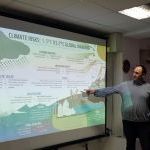Climate Action
The project offers a teacher training programme on climate action and energy efficiency in schools. It aims to reduce greenhouse gas emissions through behaviour changes in teachers and students during the lifetime of the project and beyond. To improve the capacity of academic professionals, the project has two teacher training modules: one in Berlin and one in Bulgaria. The training programmes include educational materials, field work, research tools and methodology.
Website
Climate Action project website
Country
Media
Useful links:
A number of organisations in the UK offer support on climate change issues:
WWF has a range of curriculum linked climate change resources.
Friends of the Earth have develop a Climate Action Plan for schools and colleges
* TOP TIP *
'Work with staff and pupils to develop a plan identifying how your school can be more energy efficient'
How is the project linked to climate change and sustainability?
The project helps institutions to include climate change issues in the educational system. Teaching staff will be given support and educational materials on a resource-efficient, low-carbon and climate-resilient economy. It helps address the issue that climate change is not a stand alone topic in the curriculum and aims to change the students’ and teachers’ behaviour towards low energy consumption.
Who is involved?
Teachers, trainers and students are involved. However, effective implementation requires continuous dialogue and coordination with all stakeholders. Project partners are: National Trust Eco Fund, Bulgaria; Independent Institute for Environmental Issues, Berlin; The Ministry of Education and Science, Bulgaria.
How are the participants involved?
1. Training of trainers – training in climate policies and specifics of climate change for Bulgaria;
2. Development of draft educational materials for extracurricular lessons by the teacher trainers (teachers manuals and student handouts) for kindergartens and elementary schools (for fifth to seventh grade).
3. Field work –implementation of the programme in schools where each teacher implements the project under the supervision of the professors.
4. Presentations to local authorities with six workshops to share experience and contribute to the materials;
5. Publicity –media events and website publications in the partner websites.
Key steps:
The project encourages schools to consider how their buildings and behaviours can be changed to address the issues of climate change. There are some key steps that all schools can consider in doing this:
Work with staff and pupils to develop a plan whereby the school can be more energy efficient. Design posters and signs to remind people to change their behaviour to be more climate-friendly, for example:
1. Turn the heating down - simply reducing the temperature by a degree or two can save a lot in terms of fossil fuels and green house gasses.
2. Switch off! Turn off lights and electrical appliance when not in use to save on energy consumption
3. Change to a supply of renewable energy to reduce reliance on fossil fuels
4. Encourage pupils and staff to walk and cycle to work, and provide appropriate facilities to support this
5. Think big - can you explore changes to buildings including insulation, double glazing and solar panels to reduce your carbon footprint?

